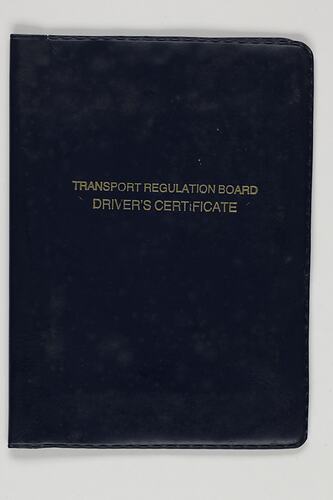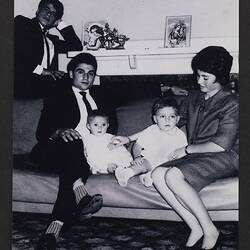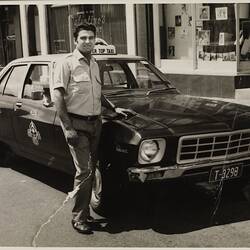Summary
Black plastic driver's certificate cover from the Transport Regulation Board for Tansa Eid to house his certificate to drive taxis in Melbourne during the 1970s.
In the early 1970s Melbourne taxi drivers were required to hold an ordinary driver's licence for three years and pass a location test before obtaining a taxi driver's certificate. After six months drivers could purchase a taxi licence for about $17 000, allowing them to own and operate a taxi business.
Brothers Youssef, Romanos and Tansa Eid were born in Hadchit, a small Maronite Catholic village in the mountains of northern Lebanon. After receiving a letter from his brother-in-law praising the economic opportunities in Australia, Youssef and his wife Nadimie migrated in 1965 with their three children. He later sponsored Tansa, Romanos and his family. They all planned to stay for a few years and return to Lebanon with enough capital to establish businesses. Instead they settled permanently and established taxi businesses in the early 1970s and experienced the highs and lows of working in the industry. With over 75 combined years of driving taxis, the Eid brothers left the industry in the 1990s and 2000s - weary of the working conditions and fearful of the impact of deregulation.
This is part of a collection of objects, documents and digital photos relating to the migration and working life of Tansa Eid who migrated to Melbourne from Lebanon in the 1960s and worked as a taxi driver along with his brothers Youssef and Romanos (whose collections the museum also holds) from the 1970s-2000s.
Significance
Statement of Historical Significance:
The taxi industry has been a significant employer of migrants since World War II and the experiences of migrant taxi drivers offer valuable insights into working life, industrial relations, and prejudice and racism. The Eid brothers taxi drivers' collection is of particular value as it spans a 35 year time period which witnessed great social and industrial changes - post World War II migration waves, Melbourne as a multicultural city, the taxi industry and balancing working and family life.
More Information
-
Collecting Areas
Migration & Cultural Diversity, Working Life & Trades, Transport
-
Awarded To
-
Inscriptions
Cover: 'TRANPORT REGULATION BOARD/DRIVER'S CERTIFICATE'
-
Classification
-
Category
-
Discipline
-
Type of item
-
Keywords
Lebanese Communities, Lebanese Immigration, Working Life, Working Conditions, Taxis, Taxi Services, Transport Workers, Racism, Weddings, Religions: Christianity


